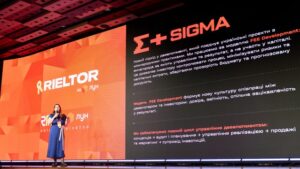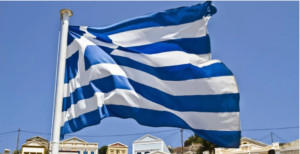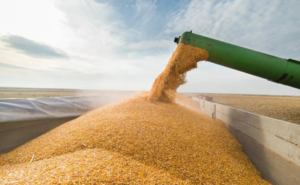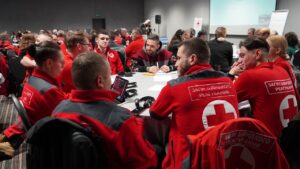
Engineering and consulting company Sigma+ plans to attract $200 million in investments for real estate projects in Ukraine in 2026, according to the company’s press service. According to the report, the company currently has more than 500,000 square meters of real estate in its portfolio, of which 390,000 square meters are residential properties.
The company focuses on attracting international investments. The priority for the period 2027-2030 is the implementation of 1 million square meters of projects, both residential and commercial. In addition, Sigma+ plans to conduct an audit of four projects in the capital to further attract financing and complete construction, according to the press release.
Sigma+ is an engineering and consulting company that provides a full range of services, from market analysis and concept development to construction management, cost control, project auditing, sales, and marketing.
According to Opendatabot, the owner and ultimate beneficiary of Sigma Engineering Plus LLC (Kyiv), registered in December 2024, is the company’s CEO Anna Laevskaya.

The Portugal Golden Visa (ARI) program, launched in 2012, was initially based on real estate investments, but after reforms, it is now more focused on funds, donations, and capital investments.
Key parameters and changes.
1) In 2023, real estate was excluded as the main route for the program, forcing investors to switch to funds, business projects, or donations.
2) The minimum investment in a fund is €500,000.
3) In 2024, a record 4,987 golden visas (main applications + dependents) were issued, which is 72% more than a year earlier.
4) Since the program began, more than 15,619 visas have been issued to investors and about 22,000 visas to family members (as of September 2024).
China remains the largest country of origin for investors, but interest from the US, Brazil, Turkey, and other countries has increased. Changes to the program have prompted investors to diversify their investments, favoring funds and non-interest-bearing methods.
Source: http://relocation.com.ua/portugal-golden-visa-program-program-features-from-relocation/

The Greece Golden Visa program, in effect since 2013, offers residency in Greece (and access to the Schengen area) in exchange for investment.
Key points of the program.
1) Real estate investment: the minimum threshold starts at €250,000 in less popular areas.
2) However, in August 2024, a differentiated threshold was introduced for popular areas: in Attica, Santorini, Mykonos, and other areas, it rose to €800,000.
3) Discounts are possible: for properties requiring renovation or conversion, the threshold remains €250,000.
4) The visa is issued for 5 years, with the possibility of extension if the investment is maintained.
5) The visa holder can include their spouse, children under 21, as well as parents and parents of their spouse without having to prove dependency.
Current trends and investor interest
Following the closure of the “golden visa” program in Spain and other countries, Greece is becoming one of the main destinations for investors, and interest from Americans has already grown significantly.
The procedure for issuing a residence permit is becoming faster — in some cases, residency is granted in about 60 days.
http://relocation.com.ua/golden-visa-greece-features-of-the-program-from-relocation/

In September 2025, Ukraine exported 2.84 million tons of agricultural products, which is 38% less than in the same month last year (4.6 million tons), according to the Ukrainian Grain Association (UGA) on Facebook.
The industry association noted that wheat exports fell by 21% to 1.83 million tons, corn exports fell 8.6 times to 61,000 tons, rapeseed exports fell 3.2 times to 238,000 tons, and soybean exports fell three times to 78,000 tons. Sunflower oil exports fell by 42% to 203,000 tons, and legume exports fell by 24% to 177,000 tons.
The only export growth in September was for barley, which rose by 4% to 238,000 tons.
At the same time, 90% of agricultural products were exported through the ports of Odessa, and 2% through the ports of the Danube. The rest of the agricultural products were transported across the western borders by rail (6%) and trucks (2%).
At the same time, exports through the ports of Odessa in September 2025 decreased by 29.2% compared to the same period last year and amounted to 2.522 million tons, through the ports of the Danube by 6.4 times to 68 thousand tons, by rail by 2.6 times, to 175 thousand tons, and by truck by 3.2 times, to 55 thousand tons.

The Ukrainian Red Cross (URC) is improving its crisis response mechanisms for emergency situations in cooperation with its partners.
“With the support of the German Red Cross, the Ukrainian Red Cross has delivered modern decontamination stations to the Rivne, Odesa, and Zaporizhzhia regions. These regions have an increased level of man-made and radiation hazards due to the location of nuclear power plants and large industrial enterprises,” the URC reported on Facebook on Saturday.
The first practical training exercises on deploying the stations took place at the training ground of the Main Directorate of the State Emergency Service in Rivne region. The event was attended by representatives of the UCC’s civil protection department and volunteers from rapid response teams from Kyiv, Rivne, Odesa, and Zaporizhzhia.
During the training, participants practiced decontamination, degassing, and sanitary treatment of equipment and victims.
Such training strengthens the teams’ readiness to work in real conditions and enhances cooperation between the Ukrainian Red Cross and the State Emergency Service of Ukraine.
Source: https://interfax.com.ua/